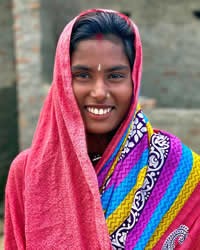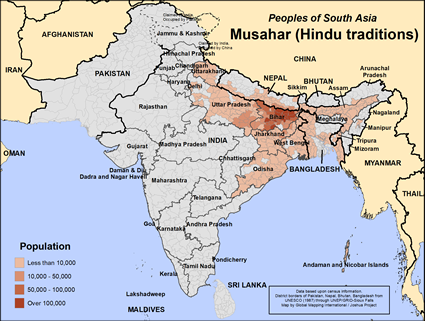Musahar (Hindu traditions) in Bangladesh

Photo Source:
Copyrighted © 2026
Kerry Olson All rights reserved. Used with permission |

Map Source:
People Group data: Omid. Map geography: UNESCO / GMI. Map Design: Joshua Project.
|
| People Name: | Musahar (Hindu traditions) |
| Country: | Bangladesh |
| 10/40 Window: | Yes |
| Population: | 16,000 |
| World Population: | 3,425,000 |
| Primary Language: | Bengali |
| Primary Religion: | Hinduism |
| Christian Adherents: | 0.01 % |
| Evangelicals: | 0.01 % |
| Scripture: | Complete Bible |
| Ministry Resources: | Yes |
| Jesus Film: | Yes |
| Audio Recordings: | Yes |
| People Cluster: | South Asia Dalit - other |
| Affinity Bloc: | South Asian Peoples |
| Progress Level: |
|
Introduction / History
The Musahar are considered one of the lowest of the low class groups in South Asian countries. Their name is derived from two words meaning "rat catcher" and is likely attributed to them for their tendency to eat rodents in times of dire need.
The Musahar are at the very lowest stratum of Indian society. The Musahar are not caste-Hindus but are from animistic Hinduism or popular Hinduism. Though most live in India, there are some in neighboring Bangladesh.
What Are Their Lives Like?
They have large families and live with several generations in the same household. A Musahar village is almost always filled with children. Though they will frequently speak Hindi, the local trade language, they will speak Angika or
Land ownership is rare and most will work as agricultural laborers, day laborers or forest and fishing. The women also work in agriculture or other unskilled labor such as stitching leaf-plates.
Education is not valued and literacy is extremely low with literacy rates running 2-6%. Often times they will drop out at the primary level due to social or economic factors. Modern development programs have had little impact on them as few if any of the sparsely allocated resources designated for them ever reach them in their need. Many times their wages are paid in crops and they trade in the marketplace through barter.
What Are Their Beliefs?
In India the Musahar are very receptive to the gospel and a move of Christ is beginning among them. A significant number of Musahar are following Christ and village house churches are being formed with Musahar leadership. A network of agencies and churches are working among the Musahar. The Musahar are in the process of being reached. However, this movement might not have made it to Bangladesh.
Traditionally they follow their tribal faith and will worship their family deity and the village deity, as well as the gods of the wider Hindu faith.
What Are Their Needs?
Due their extreme poverty they live far from towns and cities which have proper health care. Nor do they have the capacity to travel to avail themselves of these facilities. The result is a desperate health care situation. Child mortality and maternal mortality are high and the life span is short which is exacerbated by high rates of alcoholism among the male population.
Much of their condition is a result of their low position in the caste hierarchy. Any attempts at economic advancement will be taken away from them or destroyed and they have little or no capacity to retain property rights. Their constitutional rights of education and food subsidies are routinely denied through corruption and caste based policies. They are powerless and voiceless, unable to change their situation alone. Sadly many Musahar women are kidnapped or sold into prostitution in the major metropolitan cities. Without recourse this becomes their new life, oppressed, abused and forced to suffer in silence.
Prayer Points
Pray for the Lord to make a way for their physical needs to be met.
Pray for Musahar family leaders to put their identity and sense of worth in Jesus Christ rather than social status.
Pray for Musahar people in Bangladesh to have access to the gospel and embrace it.